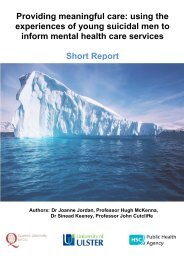Saving Mothers' Lives: - Public Health Agency for Northern Ireland
Saving Mothers' Lives: - Public Health Agency for Northern Ireland
Saving Mothers' Lives: - Public Health Agency for Northern Ireland
You also want an ePaper? Increase the reach of your titles
YUMPU automatically turns print PDFs into web optimized ePapers that Google loves.
medication after delivery and been kept under close psychiatric supervision. If these interventions had<br />
been made, her death might have been avoided.<br />
In other situations a pattern of escalating self harm may develop prior to suicide. <strong>Health</strong> professionals may<br />
be slow in offering interventions, they may not appear to take women’s threats seriously or hospital based<br />
services may be inaccessible <strong>for</strong> a woman who is distressed:<br />
A single mother with a number of children had a history of self harm and alcohol abuse. She had<br />
a miscarriage following which she repeatedly attended the Emergency Department (ED) with<br />
overdoses, alcohol intoxication and deliberate self harm. Her GP had received calls from her<br />
family expressing concern about her state. The severity of her self-harm escalated be<strong>for</strong>e her<br />
death, some months after her miscarriage. Shortly be<strong>for</strong>e she died her children were put on the<br />
child protection register after a case conference. Family members were so concerned about her<br />
that they rang the GP and he arranged <strong>for</strong> a psychiatric review the next day. She failed to attend<br />
and killed herself some days later. A subsequent psychiatric report said she found it diffi cult to<br />
engage with services, “maybe because of associated alcohol problems”.<br />
Her care was substandard because the GP failed to recognise and act on her escalating self-harm despite<br />
concerns expressed by family and multiple attendances at hospital. This case is complicated by her dual<br />
diagnosis of psychiatric illness and alcohol misuse. The GP did not appear to involve other members of the<br />
team such as the health visitor. Whilst this may have made no difference to the outcome there was a sense<br />
from the case report that everyone thought she was a “hopeless” case in any event.<br />
Another woman had poor care:<br />
A vulnerable woman had a family history of suicide, was the victim of domestic abuse and found<br />
it hard to engage with services. Antenatally she only saw her midwife because she insisted<br />
on home visits. The community mental health team (CMHT) closed her case because she did<br />
not attend appointments. Her GP saw her once after delivery, made a diagnosis of postnatal<br />
depression and prescribed citalopram but did not arrange any follow up. The health visitor carried<br />
the burden of care, appeared to be working in isolation and was unsupported. The woman killed<br />
herself some weeks later.<br />
Here the CMHT did not recognise that the woman’s failure to attend appointments might mean that she<br />
was so depressed that she was unable to leave the house. Failure to attend should be a “red fl ag” of<br />
severity requiring prompt outreach care rather than discharge. It is also possible that a specialist perinatal<br />
team may have managed this woman more actively. Her GP failed to recognise the severity of her<br />
depression when he saw her postnatally and failed to arrange follow up after starting antidepressants <strong>for</strong><br />
her depression. Her health visitor was unsupported. Better team work may have built a support network<br />
around this woman and allowed her to access appropriate care that may have prevented her death.<br />
Substance misuse and pregnancy<br />
Around 11% of all the women whose deaths were assessed during this triennium, from any cause, had<br />
problems with substance misuse. They did not all die from the drug misuse itself, but also from associated<br />
physical problems and from accidents and murder. These women are vulnerable because they often have<br />
complex and chaotic social lives; they often suffer domestic abuse, are hard to engage in antenatal care<br />
and usually fail to develop trusting relationships with health professionals. There was also much evidence<br />
of good relationships and excellent care by GPs. However, there were also instances of GPs apparently<br />
working beyond their level of expertise which may have contributed to the outcome:<br />
223



